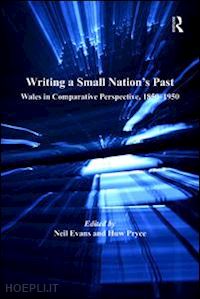Contents: Preface; Part 1 Contexts and Backgrounds: Writing a small nation’s past: states, race and historical culture, Neil Evans and Huw Pryce; National historiography, 1850-1950: the European context, R.J.W. Evans; J.E. Lloyd’s History of Wales (1911): publication and reception, Huw Pryce. Part 2 Amateurs and Popularizers: Failed founding fathers and abandoned sources: Edward Williams, Thomas Stephens and the young J.E. Lloyd, Marion Löffler; ’An account obtained from authentic documents’: Jane Williams (Ysgafell) as a historian, Gwyneth Tyson Roberts; A nation of nonconformists: Thomas Rees (1815-85) and nonconformist history, Prys Morgan; Outlaw historian: Owen Rhiscomyl and popular history in Edwardian Wales, John S. Ellis; ’A refreshingly new and challenging voice’: O.M. Edwards’s interpretation of the Welsh past, Lowri Angharad Hughes Ahronson. Part 3 Creating Academic Disciplines: From antiquarians to archaeologists in 19th-century Wales: the question of prehistory, Nancy Edwards and John Gould; John RhÅ·s, Celtic studies and the Welsh past, T.M. Charles-Edwards; The institutionalization of history in the University Colleges of Wales, 1880-1939: Aberystwyth and Bangor, Peter Lambert; Venturing into the ’jungle’: late medieval Wales in the Edwardian age, Ralph A. Griffiths; Town and nation: writing urban histories in 19th- and early 20th-century Wales, Paul O’Leary; Beyond 1282: A.H. Dodd and the problem of modern Welsh history, Neil Evans. Part 4 Comparative Perspectives: The fall of Rome and its aftermath from the 18th to the early 20th centuries, Ian Wood; History and the historians of medieval Catalonia in the late 19th and early 20th centuries, Adam J. Kosto; A forgotten anniversary: P. Hume Brown’s History of Scotland, 1911, Dauvit Broun; Robert Dudley Edwards and the uses of Catholic nationalism, Ciaran Brady; Conclusion: Welsh national history and its European context, Stefan Berger; Bibliography; Index.











